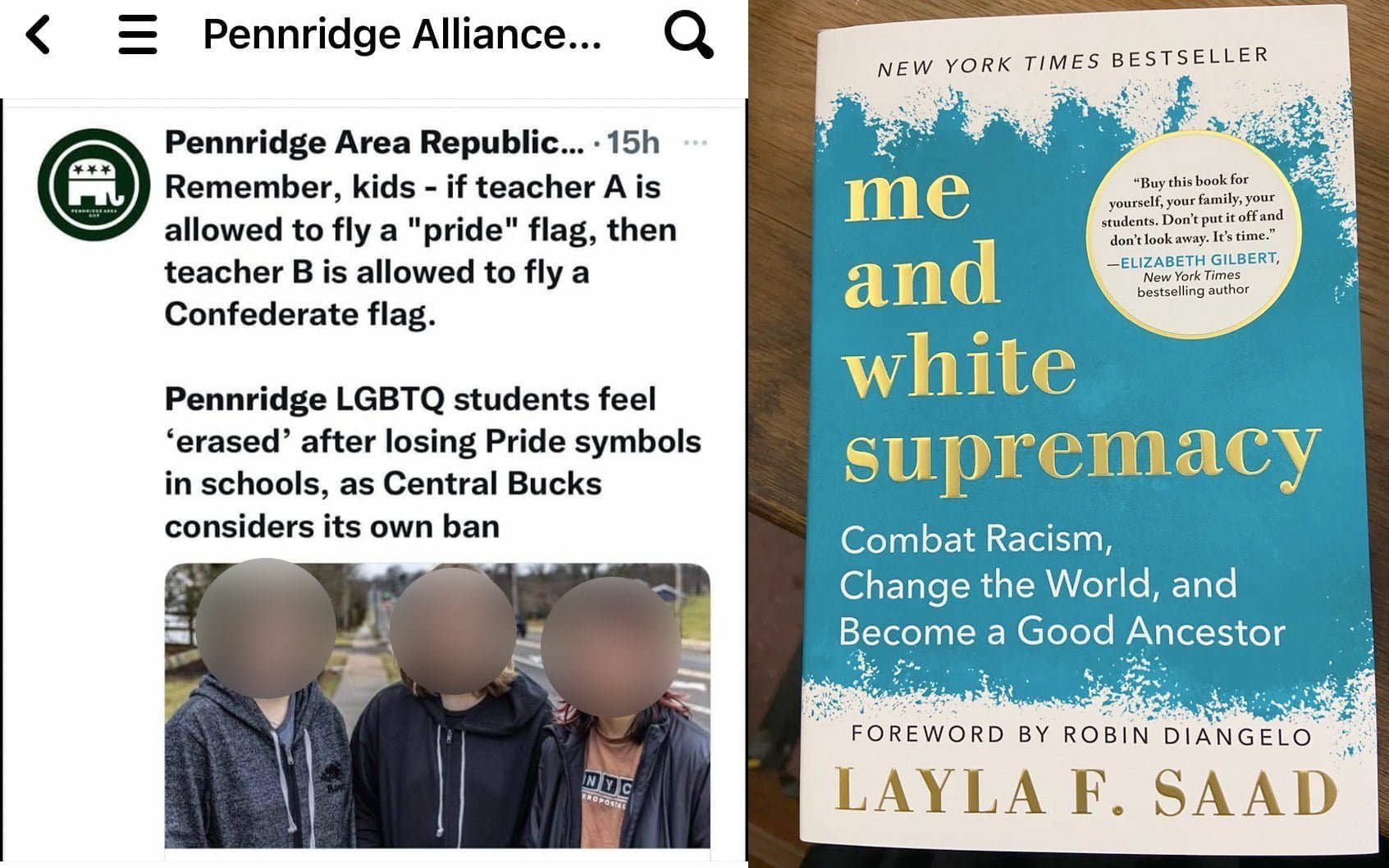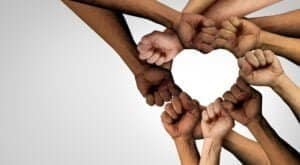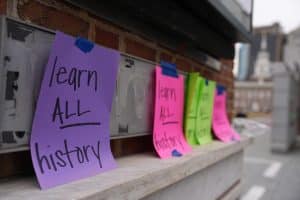As you may recall, back in January I mentioned that the Bucks County Anti-Racism Coalition would be doing a group reading challenge, and I invited readers here to do so along with us. The book “Me and White Supremacy” by Layla F. Saad takes a hard look at just how much individuals in western society have been conditioned under white supremacy, and provides a framework through a set of journal exercises for readers to unpack, recognize, and counter this conditioning. A worthwhile read and effort for anyone wanting to get serious about rejecting the internal biases to which we’ve all been subjected.
Each chapter focuses on a specific aspect of how racism manifests in our intrapersonal and interpersonal lives. Of course these two particular facets are but small parts of a larger system of institutional racism in our society, but they are important parts because they are the easiest types for an individual to change unaided and unencumbered, once they learn how. And the book does a fantastic job of showing the reader exactly how to do this.
I don’t think it’s an accident that the number of chapters happens to coincide with the number of days in Black History Month. So I offered a challenge to residents of Bucks County – read and journal along with me, and I would submit the most in-depth, thought-provoking entries to be published in this month’s column (with permission of course). Each entry below represents one journal entry from 28, each from a specific day.
Here are examples submitted from the journals of three Bucks County residents written during the challenge, in their own words:
“Despite the challenges my father faced because of his family’s religion and immigrant status he was still able to accumulate wealth, pay my college tuition and assist with my debt as a single mother of three.
I was never followed in a store or stopped in traffic. I was able to advance in a corporate career and will have a relatively comfortable retirement.
There are white privileged spaces I can feel relatively safe in that a person of color may never feel safe in.
This was driven home to me in a book club discussion of Mistakes and Miracles ( Beacon Press), which is comprised of chapters written in first person about the experiences of different Unitarian Universalist congregations on their anti-racism path. I supported the view that some of our congregants of color have expressed that we are not yet ready to have open discussions about antiracism. I expressed a wish for an open place for that to happen in. One participant became very upset and stated that there are no places she would feel safe but that she was committed and would continue to remain present to the antiracism work. I learned what it was to be uncomfortable in this work as a white person. I chose to sit in that discomfort for a time. I apologized privately and asked for facilitation from our team. This is my first visceral experience of white fragility. I don’t think my white fragility has prevented me from meaningful, personal anti racism work. I think it has made me more determined to learn and grow.
There is no doubt that my parents’ affluence contributed to our family belief system however, I will be forever grateful for my parents’ insistence on being sure that we attended a congregation where we heard the Black voices of MLK Senior, Julian Bond and Andrew Young and saw what resistance looked like in the example of a minister who marched at Selma as we grew.
That is the lesson I chose to embrace as I raised my children. I have included them in my willingness to continue to confront my internalized white supremacy.”
– Mary L
“The journey to recognizing the influence of white supremacy over your life is not for the faint of heart. I wanted to believe that it missed me somehow. That my unusual multi-cultural upbringing, father who believed in teaching me true American history, my diverse friend group over the years, had somehow precluded me from internalizing anything remotely ‘racist’. What I was unaware of was the white privilege I held.
Having bi-racial children originally took me on a journey to understand the bi-racial experience. But it leads to something deeper. An examination of my own self. When we were invited to read the book ‘Me and White Supremacy’, I wanted to believe that I wouldn’t find anything else. Yet, here I was finding that my white privilege had allowed me to be silent in moments where I should have spoken up for my black husband or bi-racial children with family or friends. Yes, I have spoken up, but there have been times where I convinced myself that my silence was “keeping the peace” or worse tone-policed my husband believing that he was ‘escalating’ the situation instead of seeing the truth. And at what cost? My white silence and tone policing allowed my husband to bear the brunt of the situation instead of using my privilege to ask people to examine their own hearts. Leaving him exhausted, feeling very alone in situations where I should have been his rock.
There have been many moments where people have commented on how ‘beautiful’ my bi-racial children are or ‘aren’t you glad you have mixed kids? They’re so gorgeous.’ My original reply was ‘yes, they are!’ thinking this was a compliment. But even when I learned the issues surrounding this concept years ago, my answer simply changed to a ‘Thank you’ instead of a teaching moment most of the time. Again slipping back into safety even though my children were being fetishized.
When my husband and I got together, I wanted to truly believe we were in a post-racial society. I found out very quickly we were not. While I have been vocal in a more broad space, this book has helped me recognize how important the small spaces are. How if I want change, it will start most effectively in moments with family, friends, and co-workers. If we’re honest with ourselves, this work is never done.”
– Tina H
“I came into the 28 day ‘Me and White Supremacy’ challenge not knowing what to expect. I know I definitely started off with a ‘Holier Than Thou’ attitude. I mean, I’ve been married to a black woman for 23 years, how could this apply to me? Well, I bet you can guess how that turned out. Along the way I realized, I had made excuses for police brutality. I didn’t speak up when I could have when something racist was uttered. I even shifted blame back on BIPOC for things that happened to them, usually starting with the words, ‘If they would just …’. So, you can see that having a front row seat for many years to what BIPOC deal with on a regular basis, still wasn’t enough to fully destroy the foundations of white supremacy instilled upon the youth of the United States of America. I don’t even know when or how these walls were built!
Let me go back in time to before I met my wife. Growing up, I would describe my family as blue collar democrats. I consider myself lucky as I do not recall ever having to listen to any racist rant or statements coming out of the mouths of my family. Being in a predominately white suburb, it was probably a ‘don’t ask, don’t tell’ situation. That said, I was never taught anything overtly racist.
I met my wife at my first ‘real’ job out of college. We met in the romantic setting of a COBOL class. If you don’t know what that is, you are lucky to be younger than I and you will never need to know. We spent several weeks in that small class together and our feelings just grew and grew over time.Since it was a small class, all of the students were pretty close and would go out to happy hours together. One night, I don’t remember the reason why, but we stopped by my parents house where I still lived at the time. I don’t know, maybe it was meant for my parents to meet her. I honestly don’t remember. Long story short, after she left, I was confronted and asked what was going on. I said, what do you mean? I was told that they didn’t think it was such a good idea. I remember saying, ‘relax, it’s not like I’m going to marry her’. Again, you can see how that turned out! We still joke about that to this day. However, it wasn’t very funny at the beginning. Not long after that confrontation I moved out of my parents house and moved in with a friend from work. After about a year, we continued to see each other even after she had moved on to another job. Things were pretty good, but we spent holidays apart. We would celebrate on the days before or after, but I would go to my parent’s alone. After a couple of cycles of holidays this way, I couldn’t take it any longer. I offered up an ultimatum. Either we would both come to celebrate the holidays or I wasn’t coming at all. This began a period of approximately a year and a half where I had no communication with my family, parents or siblings. I don’t remember exactly how it happened, but I remember hearing that my parents were having a hard time dealing with my not being part of the family. I wasn’t thrilled either. One day I called and was determined to resolve the situation in one way or another. It was decided that we would go to my parent’s house for Christmas that year. It was awkward, but everyone did their best. That was over 25 years ago. We haven’t missed a Christmas since except for 2020 due to covid.
I hope along the way that having the constant presence of a person of color at family gatherings has helped all of us deal with the grip of white supremacy. I remember thinking that it has to be good for my nieces and nephews to have grown up with a black aunt and eventually black cousins. Well, I know this relationship and marriage has had a profound effect on me. Even though I still have lots to learn, I hope I’m on the path to becoming a good ally and ancestor!”
– Mark Urbanek, New Hope
As we work to combat racism throughout Bucks County, we would be wise to remember to first look for and combat it in ourselves, each one of us. I’m no exception – I’ve talked about my own experiences with internalized racism on YouTube. And because it takes a collective effort to resist bias, I could not ask my readers what I was not willing to do myself. So feel free to browse my own entries from this challenge, all 28 days, starting with day one. I’m hoping that my own experiences as well as those above help you, dear reader, gain some insight into countering racism both out in the world, and also in yourself – because change begins with you (yes, you).






